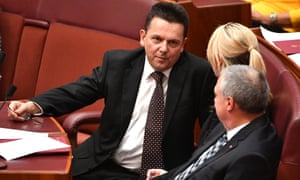Nick Xenophon says he has “real concerns” about a plan by the
Turnbull government to change the rules governing the Clean Energy
Finance Corporation so it could invest in a new “clean” coal plant.
With Labor and the Greens opposed to any such change, the government will likely need the support of the crossbench to overhaul the CEFC’s mandate.
Currently, the CEFC cannot invest in any project that does not reduce emissions by 50% or more on the average across the national electricity market. That prohibition is contained in CEFC investment guidelines, which means it may be possible to change without parliament’s support.
The CEFC legislation, enacted by the previous Labor government, rules out funding nuclear power and carbon capture and storage and will require Senate support to change.
Xenophon told Guardian Australia on Wednesday the government was yet to approach him about the proposal but “instinctively, we’ve got real concerns about it”.
“The issue is that funding that goes to a coal generator will inevitably mean that other projects miss out.”
The leader of the NXT has been looking at ways to try and convince the government to look again at an emissions intensity scheme for the electricity sector – a form of carbon trading – which the government ruled out after a brief internal revolt.
It is possible Xenophon could use a discussion about the CEFC’s mandate to try and persuade the government to keep an open mind on carbon trading.
At a press conference with the International Energy Agency executive director, Fatih Birol, the environment minister, Josh Frydenberg, said the government was looking at all its options, including changing the CEFC rules, to ensure a “technology-neutral” approach to energy.
Guardian Australia understands the government is examining options to change the CEFC’s investment rules on “high energy, low emissions” coal power plants because it may be possible to do so in a way that prevents the Senate disallowing the change.
Birol said carbon capture and storage would need to play a “stronger role” if the world was to meet its target of 2C of warming.
“For this, there is a need for a greater initiative from countries, maybe such as Australia,” he said. “There is a lot of interest [in CCS] but investment is not appropriately proportional to that interest.”
He acknowledged that without taxpayer subsidies it would be difficult to make CCS viable.
Birol said CCS did not yet match renewables for the cost of bringing emissions down but suggested further investment and development could change that.
Birol said Australia should “definitely” be relying more on gas energy and the IEA saw “huge chances” for it to increase its production of unconventional gas.
Asked about bans on coal seam gas, Birol said the IEA’s analysis showed that with companies’ co-operation environmental problems could be reduced to zero.
“I don’t see, in general, a reason to ban unconventional gas exploration and production if those measures are taken.”
With Labor and the Greens opposed to any such change, the government will likely need the support of the crossbench to overhaul the CEFC’s mandate.
Currently, the CEFC cannot invest in any project that does not reduce emissions by 50% or more on the average across the national electricity market. That prohibition is contained in CEFC investment guidelines, which means it may be possible to change without parliament’s support.
The CEFC legislation, enacted by the previous Labor government, rules out funding nuclear power and carbon capture and storage and will require Senate support to change.
Xenophon told Guardian Australia on Wednesday the government was yet to approach him about the proposal but “instinctively, we’ve got real concerns about it”.
The leader of the NXT has been looking at ways to try and convince the government to look again at an emissions intensity scheme for the electricity sector – a form of carbon trading – which the government ruled out after a brief internal revolt.
It is possible Xenophon could use a discussion about the CEFC’s mandate to try and persuade the government to keep an open mind on carbon trading.
At a press conference with the International Energy Agency executive director, Fatih Birol, the environment minister, Josh Frydenberg, said the government was looking at all its options, including changing the CEFC rules, to ensure a “technology-neutral” approach to energy.
Guardian Australia understands the government is examining options to change the CEFC’s investment rules on “high energy, low emissions” coal power plants because it may be possible to do so in a way that prevents the Senate disallowing the change.
Birol said carbon capture and storage would need to play a “stronger role” if the world was to meet its target of 2C of warming.
“For this, there is a need for a greater initiative from countries, maybe such as Australia,” he said. “There is a lot of interest [in CCS] but investment is not appropriately proportional to that interest.”
He acknowledged that without taxpayer subsidies it would be difficult to make CCS viable.
Birol said CCS did not yet match renewables for the cost of bringing emissions down but suggested further investment and development could change that.
Birol said Australia should “definitely” be relying more on gas energy and the IEA saw “huge chances” for it to increase its production of unconventional gas.
Asked about bans on coal seam gas, Birol said the IEA’s analysis showed that with companies’ co-operation environmental problems could be reduced to zero.
“I don’t see, in general, a reason to ban unconventional gas exploration and production if those measures are taken.”

No comments:
Post a Comment